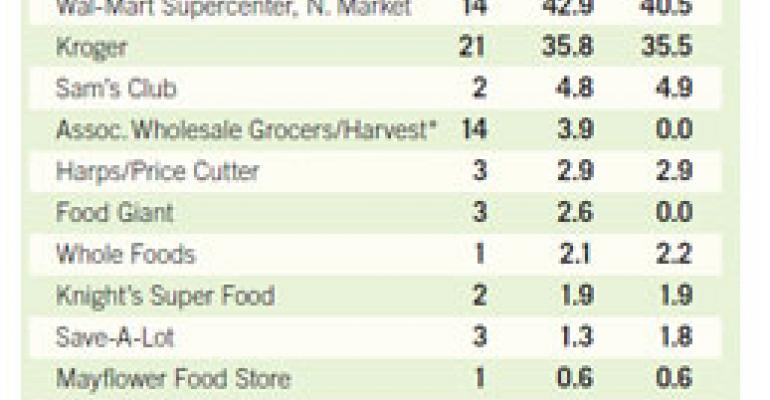KROGER CO. and Wal-Mart Stores continue to battle it out in Little Rock, Ark., with Wal-Mart extending its lead this past year.

The 12 Wal-Mart Supercenters and two Neighborhood Markets in Little Rock have a market share of 42.9%, up from 40.5% with one less supercenter a year ago.
Cincinnati-based Kroger, with 21 stores operating in the market for the past two years, saw its share climb to 35.8% from 35.5% a year ago. That left it with a share gap of 7.1% this year, compared with 5% last year.
“Wal-Mart does a good job presenting itself as the place to go for consumers looking for price alone, while Kroger does a good job appealing to middle and upscale shoppers,” an industry observer told SN. “In the last year or so Kroger has been getting more promotional, with hotter offers, as shoppers have become more interested in buying on deal.”
While the state of Arkansas has “more than its fair share of Neighborhood Markets,” the observer pointed out, “there are only two in the Little Rock market. And while both are doing fairly well, they require a lot of volume to make money, and it's not clear how happy Wal-Mart is with that format.”
Little Rock is the state capital and Arkansas' most populous city, with just under 1 million people living in the metropolitan area. Half of the population is white, 42% African American, 5% Hispanic and 2% Asian.
The biggest event in the grocery industry last year was the bankruptcy and ultimate dissolution of Affiliated Foods Southwest, a Little Rock-based wholesaler. Of the 45 corporate-owned stores it operated, 31 were closed and the other 14 were sold to other retailers.
“Kroger was the biggest beneficiary of the Affiliated meltdown,” a local source told SN. “It invested money remodeling its Little Rock stores in an effort to make sure someone else didn't enter the market by buying up most of the Affiliated-supplied stores, and as a result, the handful of stores that were bought were acquired by smaller independents.”
The 14 that were sold went to a variety of area independents — with Associated Wholesale Grocers, Kansas City, Kan., taking over as their supplier — and currently have a combined market share of 3.9%, compared with 7.9% for the original 45-store group.
Among other local operators, the two locations operated by Sam's Club have a 4.8% market share, compared with 4.9% last year; and the three units operated by Springdale, Ark.-based Harps Food Stores control a market share of 2.9%, unchanged from the prior year.
Though Harps operates 64 stores across Arkansas and Oklahoma, it is only a minor player in Little Rock, operating 32,000-square-foot stores in the city's suburbs “that are smaller and more convenient for some people to shop in,” a local source pointed out, enabling it to pick off some business from Wal-Mart and, to a larger degree, Kroger.





